Econometric Tools for Macroeconomic Forecasting and Simulation
This research group advances the development and application of quantitative macroeconometric models to improve the accuracy, transparency, and policy relevance of macroeconomic forecasts and simulations. Its work supports the empirical and methodological foundation of the IWH’s forecasting activities and policy recommendations.
The group focuses on both short-term forecasting and simulation-based assessments of long-term economic developments, with particular attention to the interactions between economic activity and the environment. Key areas of expertise include reduced-form models for short-term forecasting, regional disaggregation of macroeconomic trends, structural forecasting techniques, and Dynamic Stochastic General Equilibrium (DSGE) models for scenario analysis.
In addition to its core research, the group develops customized forecasting tools and conducts applied analyses in third-party funded projects. Recent collaborations include model development for Volkswagen Bank, economic ministries in Central Asia (supported by GIZ), the German Environment Agency (UBA), and the EU Horizon 2020 project ENTRANCES, which addresses clean energy transitions in European regions.
By integrating rigorous econometric methods with practical applications, the group contributes to a better understanding of macroeconomic dynamics and enhances the basis for evidence-based policy decisions at national and international levels.
Research Cluster
Economic Dynamics and StabilityYour contact

- Department Macroeconomics
EXTERNAL FUNDING
07.2022 ‐ 12.2026
Evaluation of the InvKG and the federal STARK programme
German Federal Ministry for Economic Affairs and Climate Action
On behalf of the Federal Ministry of Economics and Climate Protection, the IWH and the RWI are evaluating the use of the approximately 40 billion euros the federal government is providing to support the coal phase-out regions..
12.2024 ‐ 02.2026
Macroeconomic Modelling for Energy Investments in Vietnam
Deutsche Gesellschaft für Internationale Zusammenarbeit (GIZ) GmbH
08.2024 ‐ 03.2025
Strengthening Public Financial Management in Vietnam
Deutsche Gesellschaft für Internationale Zusammenarbeit (GIZ) GmbH
01.2023 ‐ 12.2023
Early determination of stable results for gross domestic product or real economic growth and gross value added at federal state level
Landesbetrieb Information und Technik Nordrhein-Westfalen
The project examines whether the accuracy of the first estimate of gross value added and gross domestic product for the federal states can be increased, thereby reducing the extent of subsequent revisions.
01.2018 ‐ 12.2023
EuropeAid (EU Framework Contract)
Europäische Kommission
05.2020 ‐ 09.2023
ENTRANCES: Energy Transitions from Coal and Carbon: Effects on Societies
Europäische Kommission
ENTRANCES aims at examining the effects of the coal phase-out in Europe. How does the phase-out transform society – and what can politics do about it?
This project has received funding from the European Union’s Horizon 2020 research and innovation programme under grant agreement No 883947.
10.2019 ‐ 01.2023
Climate Resilient Economic Development
Climate change has a substantial impact on economic growth and a country’s development. This increases the need for reliable and viable approaches to assessing the impact of climate risks and potential adaptation scenarios. Political decision-makers in ministries of planning and economy need sound forecasts in order to design and finance adequate economic policy instruments and actively to take countermeasures. In the pilot countries (Georgia, Kazakhstan and Vietnam), climate risk is included in macroeconomic modelling, enabling the results to be integrated into the policy process so as to facilitate adapted economic planning. The IWH team is responsible for macroeconomic modelling in Vietnam.
07.2016 ‐ 12.2018
Climate Protection and Coal Phaseout: Political Strategies and Measures up to 2030 and beyond
01.2017 ‐ 12.2017
Support to Sustainable Economic Development in Selected Regions of Uzbekistan
01.2017 ‐ 12.2017
Short-term Macroeconomic Forecasting Model in Ministry of Economic Development and Trade of Ukraine
01.2016 ‐ 12.2017
Development of analytical tools based on Input-Output table
The aim of the project was the development of an analytical tool to assess the gains and losses of possible state programs supporting the development of the private sector of the Tajik economy.
11.2015 ‐ 12.2016
Employment and Development in the Republic of Uzbekistan
Support to sustainable economic development in selected regions of Uzbekistan
05.2016 ‐ 05.2016
Framework and Finance for Private Sector Development in Tajikistan
02.2016 ‐ 04.2016
Macroeconomic Reforms and Green Growth - Assessment of economic modelling capacity in Vietnam
10.2015 ‐ 03.2016
Improved Evidence-based Policy Making - GIZ Tadschikistan
Deutsche Gesellschaft für Internationale Zusammenarbeit (GIZ) GmbH
Refereed Publications
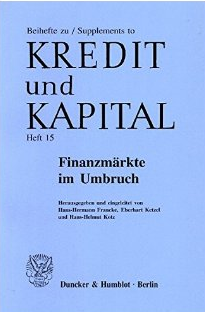
The Financial Crisis from a Forecaster's Perspective
in: Kredit und Kapital, No. 1, 2012
Abstract
This paper analyses the recession in 2008/2009 in Germany. This recession is very different from previous recessions in particular regarding their causes and magnitude. We show to what extent forecasters and forecasts based on leading indicators fail to detect the timing and the magnitude of the recession. This study shows that large forecast errors for both expert forecasts and forecasts based on leading indicators resulted during this recession which implies that the recession was very difficult to forecast. However, some leading indicators (survey data, risk spreads, stock prices) have indicated an economic downturn and hence, beat univariate time series models. Although the combination of individual forecasts provides an improvement compared to the benchmark model, the combined forecasts are worse than several individual models. A comparison of expert forecasts withthe best forecasts based on leading indicators shows only minor deviations. Overall, the range for an improvement of expert forecasts in the crisis compared to indicator forecasts is small.
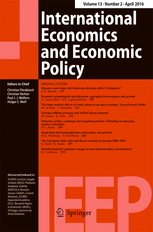
An Evolutionary Algorithm for the Estimation of Threshold Vector Error Correction Models
in: International Economics and Economic Policy, No. 4, 2011
Abstract
We develop an evolutionary algorithm to estimate Threshold Vector Error Correction models (TVECM) with more than two cointegrated variables. Since disregarding a threshold in cointegration models renders standard approaches to the estimation of the cointegration vectors inefficient, TVECM necessitate a simultaneous estimation of the cointegration vector(s) and the threshold. As far as two cointegrated variables are considered, this is commonly achieved by a grid search. However, grid search quickly becomes computationally unfeasible if more than two variables are cointegrated. Therefore, the likelihood function has to be maximized using heuristic approaches. Depending on the precise problem structure the evolutionary approach developed in the present paper for this purpose saves 90 to 99 per cent of the computation time of a grid search.
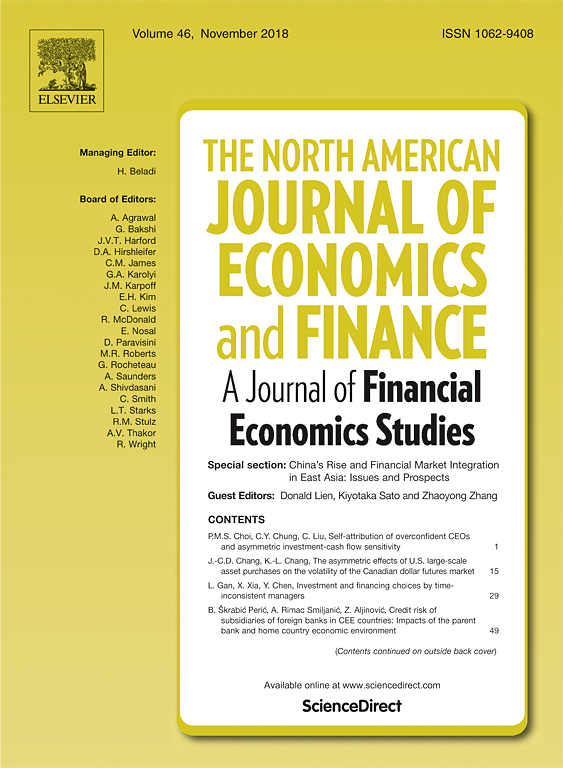
Inflation Expectations: Does the Market Beat Professional Forecasts?
in: North American Journal of Economics and Finance, No. 3, 2011
Abstract
The present paper compares expected inflation to (econometric) inflation forecasts based on a number of forecasting techniques from the literature using a panel of ten industrialized countries during the period of 1988 to 2007. To capture expected inflation, we develop a recursive filtering algorithm which extracts unexpected inflation from real interest rate data, even in the presence of diverse risks and a potential Mundell-Tobin-effect. The extracted unexpected inflation is compared to the forecasting errors of ten econometric forecasts. Beside the standard AR(p) and ARMA(1,1) models, which are known to perform best on average, we also employ several Phillips curve based approaches, VAR, dynamic factor models and two simple model avering approaches.
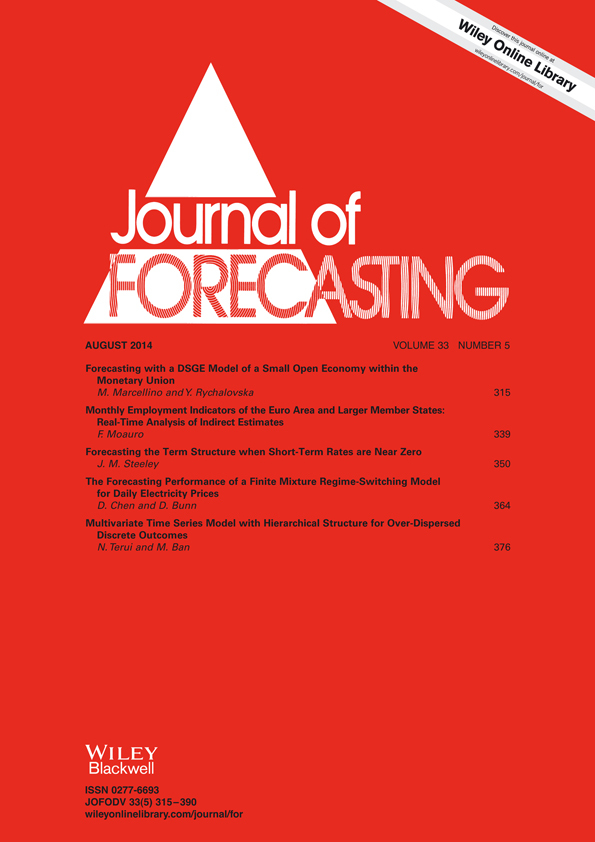
Flow of Conjunctural Information and Forecast of Euro Area Economic Activity
in: Journal of Forecasting, No. 3, 2011
Abstract
Combining forecasts, we analyse the role of information flow in computing short-term forecasts up to one quarter ahead for the euro area GDP and its main components. A dataset of 114 monthly indicators is set up and simple bridge equations are estimated. The individual forecasts are then pooled, using different weighting schemes. To take into consideration the release calendar of each indicator, six forecasts are compiled successively during the quarter. We found that the sequencing of information determines the weight allocated to each block of indicators, especially when the first month of hard data becomes available. This conclusion extends the findings of the recent literature. Moreover, when combining forecasts, two weighting schemes are found to outperform the equal weighting scheme in almost all cases. Compared to an AR forecast, these improve by more than 40% the forecast performance for GDP in the current and next quarter.
Working Papers
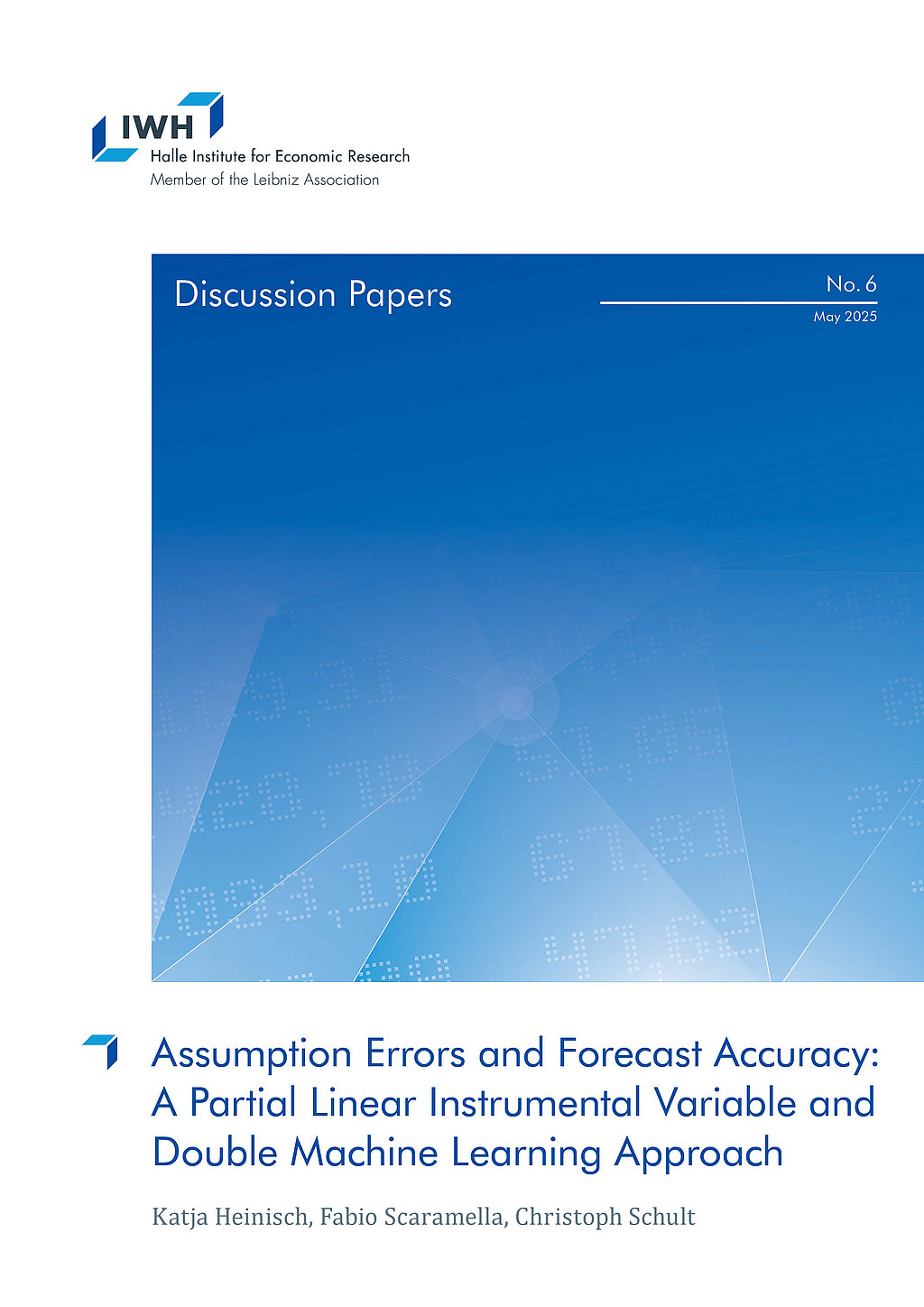
Assumption Errors and Forecast Accuracy: A Partial Linear Instrumental Variable and Double Machine Learning Approach
in: IWH Discussion Papers, No. 6, 2025
Abstract
<p>Accurate macroeconomic forecasts are essential for effective policy decisions, yet their precision depends on the accuracy of the underlying assumptions. This paper examines the extent to which assumption errors affect forecast accuracy, introducing the average squared assumption error (ASAE) as a valid instrument to address endogeneity. Using double/debiased machine learning (DML) techniques and partial linear instrumental variable (PLIV) models, we analyze GDP growth forecasts for Germany, conditioning on key exogenous variables such as oil price, exchange rate, and world trade. We find that traditional ordinary least squares (OLS) techniques systematically underestimate the influence of assumption errors, particularly with respect to world trade, while DML effectively mitigates endogeneity, reduces multicollinearity, and captures nonlinearities in the data. However, the effect of oil price assumption errors on GDP forecast errors remains ambiguous. These results underscore the importance of advanced econometric tools to improve the evaluation of macroeconomic forecasts.</p>

Banks and the State-Dependent Effects of Monetary Policy
in: NBER Working Papers, No. 33523, 2025
Abstract
<p>We show that the response of banks’ net interest margin (NIM) to monetary policy shocks is state dependent. Following a period of low (high) Federal Funds rates, a contractionary monetary policy shock leads to an increase (decrease) in NIM. Aggregate economic activity exhibits a similar state-dependent pattern. To explain these dynamics, we develop a banking model in which social interactions influence households’ attentiveness to deposit interest rates. We embed that framework within a nonlinear heterogeneous-agent NK model. The estimated model accounts well quantitatively for our key empirical findings.</p>
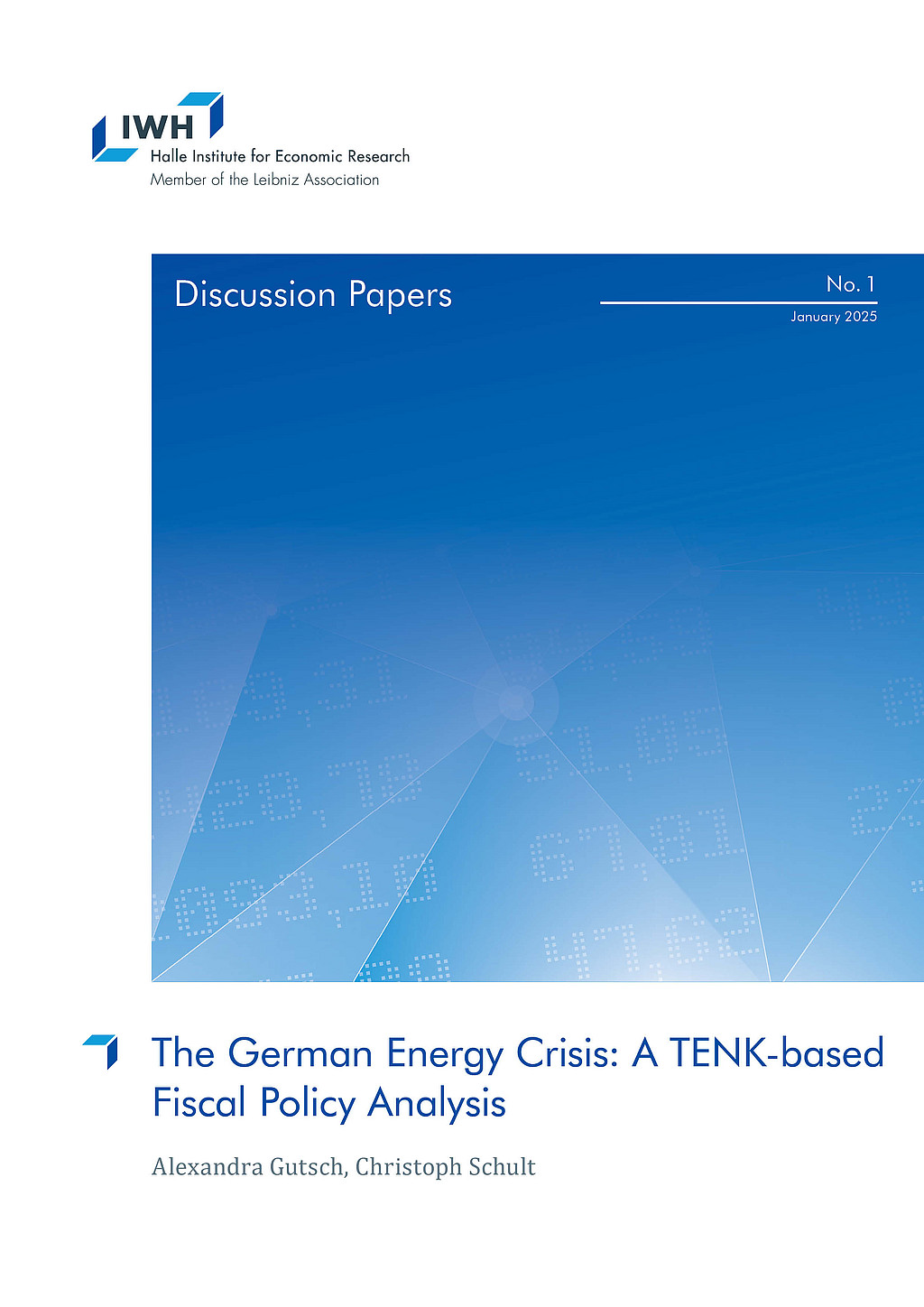
The German Energy Crisis: A TENK-based Fiscal Policy Analysis
in: IWH Discussion Papers, No. 1, 2025
Abstract
<p>We study the aggregate, distributional, and welfare effects of fiscal policy responses to Germany’s energy crisis using a novel Ten-Agents New-Keynesian (TENK) model. The energy crisis, compounded by the COVID-19 pandemic, led to sharp increases in energy prices, inflation, and significant consumption disparities across households. Our model, calibrated to Germany’s income and consumption distribution, evaluates key policy interventions, including untargeted and targeted transfers, a value-added tax cut, energy tax reductions, and an energy cost brake. We find that untargeted transfers had the largest short-term aggregate impact, while targeted transfers were most cost-effective in supporting lower-income households. Other instruments, as the prominent energy cost brake, yielded comparably limited welfare gains. These results highlight the importance of targeted fiscal measures in addressing distributional effects and stabilizing consumption during economic crises.</p>
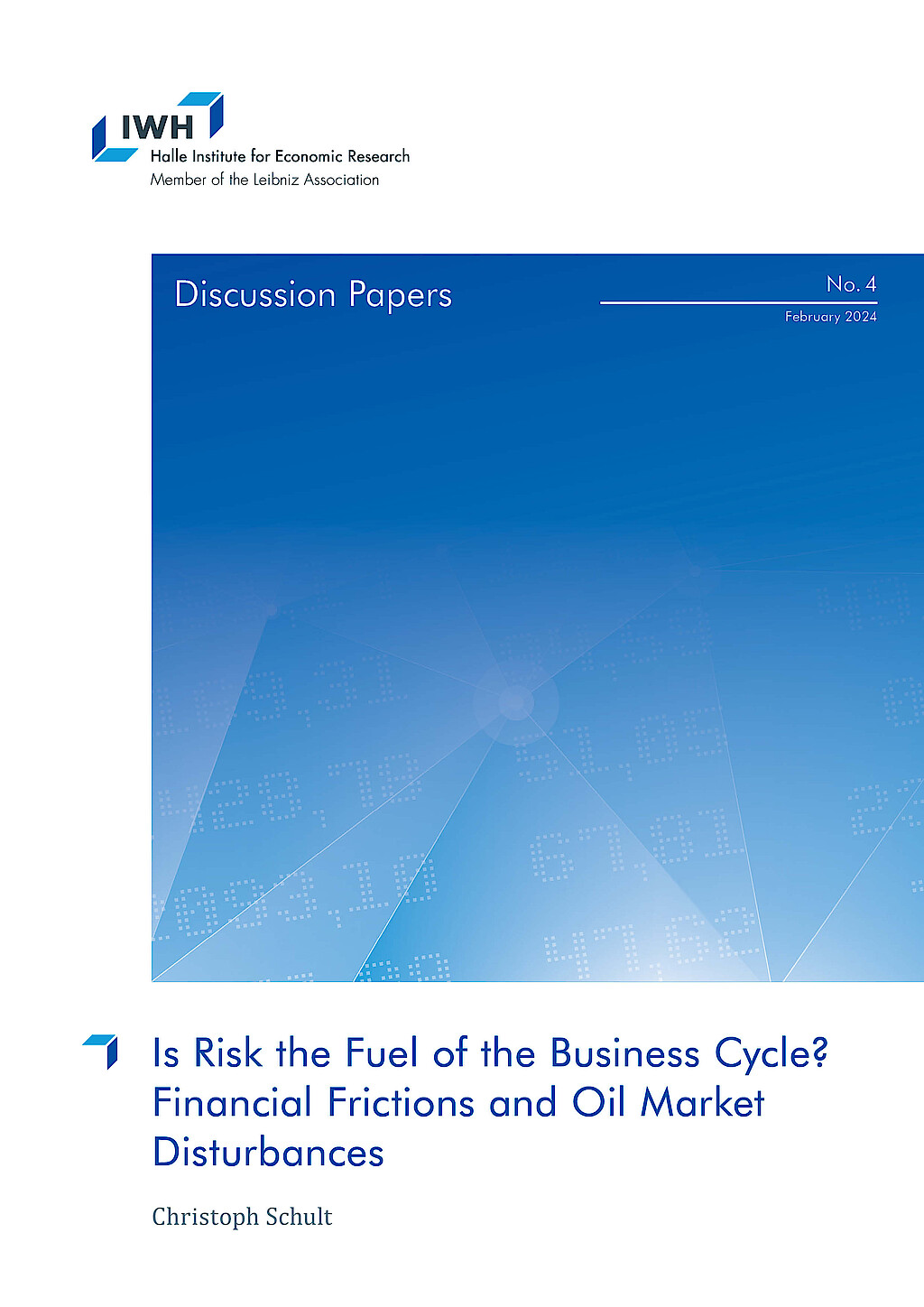
Is Risk the Fuel of the Business Cycle? Financial Frictions and Oil Market Disturbances
in: IWH Discussion Papers, No. 4, 2024
Abstract
I estimate a dynamic stochastic general equilibrium (DSGE) model for the United States that incorporates oil market shocks and risk shocks working through credit market frictions. The findings of this analysis indicate that risk shocks play a crucial role during the Great Recession and the Dot-Com bubble but not during other economic downturns. Credit market frictions do not amplify persistent oil market shocks. This result holds as long as entry and exit rates of entrepreneurs are independent of the business cycle.
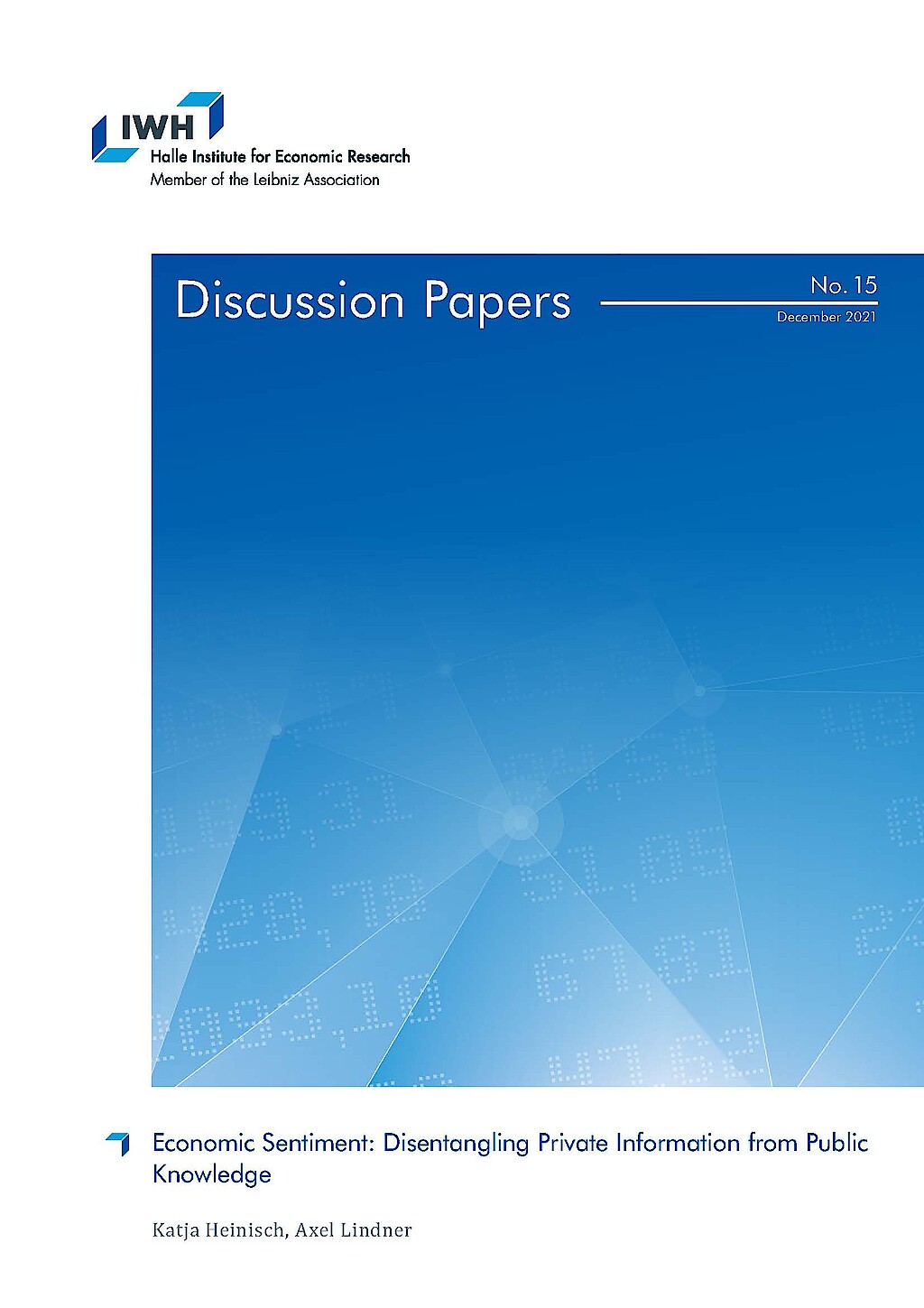
Economic Sentiment: Disentangling Private Information from Public Knowledge
in: IWH Discussion Papers, No. 15, 2021
Abstract
This paper addresses a general problem with the use of surveys as source of information about the state of an economy: Answers to surveys are highly dependent on information that is publicly available, while only additional information that is not already publicly known has the potential to improve a professional forecast. We propose a simple procedure to disentangle the private information of agents from knowledge that is already publicly known for surveys that ask for general as well as for private prospects. Our results reveal the potential of our proposed technique for the usage of European Commissions‘ consumer surveys for economic forecasting for Germany.


























